Collages Read online
Page 11
Bill put his short, stocky hand on Lisa’s knee and said smiling at Renate: “Well, isn’t it good to be home again? One of these days you’ll throw out all this fancy foreign stuff and be yourself again.”
“Home?” asked Renate.
“Home, yes,” said Bill. “Lisa lived around the corner from here when we were kids. We played in this street together. I was the first boy who kissed her. We had not seen each other for twenty years. She wanted me to stay in Acapulco and live her life, with all those phonies talking languages I couldn’t understand. I didn’t think she’d bring all this stuff with her. I can’t bring my friends here for a game of cards.”
Lisa’s sister said: “We both worked in the same office. The trouble started when she won a painting scholarship to Mexico. It all went to her head. She married an oil man. And then a man with a yacht big enough to sail to Europe.”
And because the paintings, the plants, the statues, the flowers and birds had been transplanted, not born there, they began to seem as they talked, like a background for a painting, and Lisa herself a model hired for one afternoon to sit for a painter, and Bill and Lisa’s sister like boors who had entered a gallery by mistake, expecting pictures of horses and trout fishing and found themselves in a dream painted by Rousseau, a couch in the middle of the jungle.
Would Bill and his card-playing friends be able to cage Lisa? Her cage now would be the stripes of dusty sunlight falling through the rails of the Third Avenue Elevated trains.
Bill shut off the record player before the Mexican song was finished.
Bill had come and awakened her from her dream of Acapulco with a cigar flavored kiss from the ashcan painting period of her childhood.
THE BELL RANG. IT WAS DOCTOR MANN with flowers for Lisa and a cigar for Bill.
He was collecting paintings to exhibit in Israel. He wanted to borrow some of Lisa’s Mexican paintings.
He had heard about Renate’s paintings and said he would be proud to take some back with him.
But he was not a painting fetichist. His particular hobby was quite exceptional.
Once a year Doctor Mann flewfrom Israel on a mysterious mission. But his leisure time he spent in visiting women writers. One by one he visited them all. He brought them brandy and chocolates from Israel, books to sign for his collection of autographed editions, and kissed them only once on parting.
He boasted of these friendships as other men boast of sexual conquests.
Many of these visits required patience, diplomacy and research work. First of all, to find their addresses, and then someone who might introduce him, and then to obtain an appointment, and, most difficult of all, to gain the privilege of a tête à tête.
His hair grew grey. His library of dedicated books was rich in treasures.
Just as Don Juan was always eager to test his charm on frigid women, Doctor Mann finally encountered the most inaccessible of all women writers and felt challenged to woo her.
He heard that Judith Sands was not only difficult to meet but that she avoided everyone related to the literary world. She led a secluded life in the Village, New York, and it was rumored that she preferred obscure village bars and anonymous company.
A few bar addicts vaguely remembered talking with a woman called Judith Sands but they insisted that she talked like a truck driver and could not possibly have written the poetic and stylized mythological novel she was praised for.
Those who lived in Paris before the war remembered a handsome, red-haired amazon in a tailored suit who sat at the Dôme.
A few who lived in the Village knew her, but no one had anything to say, no revelations, no messages, as if those who knew her practiced a sick room secrecy, as if she had sealed their lips. There was an unnatural silence around her, either because she had satirized everyone, which she was known to do, or because those who respected her work did not wish to expose a Judith who did not resemble her parabolic work.
Several of the flat-soled women in tailored suits who walked down Eighth Street could have been Judith Sands. In an age of glaring, crude limelight, she had been able to avoid all familiarity, and her anonymity was preserved by an invisible repellent.
It was as if her novel had been the story of an earthquake by one of its victims; the book once written, and the author with it, seemed to have fallen into a crevice.
This shadowy figure aroused Doctor Mann’s love of conquest. He bought a bottle of champagne and rushed to the address he had been given. There was no name on the bell to the apartment, but he had been told that she lived on the second floor. Doctor Mann climbed the dark stairway and knocked on a dark door. No answer.
He waited and knocked again.
Silence.
He paced the frayed rug. He stared with an ironic smile at the empty niche where the stairway made a turn. When the Village was Italian, the statue of a saint had nestled there. He sat down inside the niche and waited. His ear caught a rustle inside, and it was enough to encourage his verbal gallantry.
He began an interminable monologue like one of the characters in her novel.
Every novelist knows that at one time or another he will be confronted with the incarnation of one of his characters. Whether that character is based on a living person or not, it will draw into its circle those who resemble it. Sooner or later the portrait will attract its twin, by the magnetism of narcissism, and the author will feel this inhabitant of his novel come to life and hear his character speaking as he had imagined.
And so, Doctor Mann, in the same fast liquid monologue she had set down, picked up his own story in Siberia where he had been sent for rebellion against the regime, and where there was nothing to nourish him except books; where his faith in woman’s intuitive knowledge had made him translate Judith Sand’s book into Hebrew; from there to his American wife and children in a modern apartment in Israel and his work with a newspaper which put him in touch with all the plays and books being written.
”You know, my dear Judith Sands, I am not here to frighten you, or violate your privacy. I am not a man visiting a woman. I am a man with a profound love of words. In the words of the Talmud: ‘Kaka tuv… It is written.’ I know you do not like strangers; but, just as you are no stranger to me, I cannot be a stranger to you because I feel that, in a sense, you gave birth to me. I feel you once described a man who was me before I knew who I was, and it was because I recognized him that I was able to be myself. You will recognize me when you see me. I am sure you have already recognized how I think; this mixture in me which makes me feel my way through experience as women do, and yet talk even when I do not wish to talk like an intellectual, a scholar (which is mockery as I do not believe that they know as much as the poet in his delirium). I have grown grey hairs waiting to meet you. I could not find your address or anyone who knew you. Then a taxi driver told me he had just driven uptown a woman who talked as I did, with a man with an English accent, and he said they were going to the opening of his cocktail party; and then I knew you were in New York and had been with T. S. Eliot. Every word you wrote I ate, as if it was manna. Finding one’s self in a book is a second birth; and you are the only one who knows that at times men behave like women and women like men, and that all these distinctions are mock distinctions, and that is why your doctor put on a wig when he wanted to talk about his loves, and I don’t know why Thomas Mann wrote about Transposed Heads for there are other transpositions of far greater interest, and your story is the most accurate in the world.”
No answer.
But there was a creak of a chair, and a soft footstep on the floor behind the door.
Doctor Mann added: “I am leaving my gifts to you on the door mat. I hope you like champagne.”
“I don’t drink,” said a low, deep voice behind the closed door.
“Well, you can offer it to your friends. Tomorrow I fly back to Israel at nine in the evening, I will come again at five o’clock. Perhaps you will open your door to a man who is going away.
And you will see I am no stranger. Remember this, it is good for a writer to meet with the incarnation of a character he has invented. It gives him an affirmation, a substantial proof of his intuitions, divinations. Here I stand before you, talking as you said I might, and reminding you that what may have seemed a ghost in a dream, in your smoke-filled heart at night, is a man who got his knowledge and his degrees from books in a cell in Siberia, and who translated you by the light of a candle.”
“Come back tomorrow. We’ll have coffee together,” said the voice.
The next day he came. But there was no answer to his knock and so he began his monologue: “When you deny me the presence of a writer, you really deny me a part of myself that has not yet been born, and whose existence I need to believe in. I always wanted to be a writer, but I talk too much, it evaporates, or it may be I have not yet decided whether to write as a man or as a woman. But you have been my writer self writing for me. I could talk wastefully, negligently, only because you were there preserving and containing my spirit. When you deny me your presence, you commit spiritual murder, for if I have been for years talking with your words, spending them lavishly, extravagantly, it was only because I believed I could always renew myself at the source. You may feel this was an imposition. No one should be forced to carry the unfulfilled self of another. But if you are so skilled with words and have already written me, in a sense you have stolen me, and must return what you stole. You must come out and say: ‘I will go on writing for you. I will be your articulateness. I gave birth to you and I must grant you the fullest expansion of speech.’ And you need me, Judith Sands. You must not stifle yourself behind closed doors. Solitude may rust your words. Silence is not your element. It will asphyxiate you. We need each other! We are indispensable to each other. I to your work and you to my life. Without me spending your words you may not be incited to mint new ones. I am the spendthrift and you the coiner. We cannot live completely apart. And if I speak your character on perhaps a lower key than you had intended, even perhaps with a few false notes, it is because I have never met a writer with perfect pitch. If you refuse to talk to a plain man like me, your ambiguities will become intolerably tenuous, like the end of your book, which I do not understand.”
The door opened halfway. Judith Sands appeared shadowed against the light. Behind her, a chaotic lair, undistinguishable objects in wild disorder. She closed the door upon her cavernous dwelling and gave Doctor Mann her strong, firm hand.
“I am not absolutely certain of the meaning of that end to my book, but I am sure of one thing, that human beings can reach such desperate solitude that they may cross a boundary beyond which words cannot serve, and at such moments there is nothing left for them but to bark.”
As they walked together Doctor Mann asked: “Is it true what they say that you have written another book, that you keep it hidden in cartons, under your bed, that no one has read it?”
“Yes, it is true.”
“Why won’t you let it be read, published? It will shatter your solitude.”
“No, it will only aggravate it. The more they read of me, the louder they deny my existence, the existence of my characters. They say I have only described unique specimens.”
“But I can show you how these specimens reproduced themselves. They are scattered over the world. I will take you to the places where I know your book is a perpetual house guest, always sitting in the library, a guest of honor. You will only meet those who nourished themselves on it, the descendants of your characters.”
Doctor Mann observed how carefully Judith Sands had sought to efface in herself all traces of having been the woman once so wildly loved in her own novel. She had created a neutral appearance, wearing colors one would not notice nor remember, anonymous clothes, a cape which concealed the lines of her body, a Tyrolian hat with a feather on it. The feather, however, had retained its impertinence, from the days when she won every tournament with her wit.
“Solitude,” said Doctor Mann, “is like Spanish moss which finally suffocates the tree it hangs on.”
“Don’t you think I have thought of that whenever someone slips a piece of paper under my door saying ‘I love you Judith Sands’; don’t you think I ask myself is this another come to love me and also destroy me? Another one staying out all night and with each step away from me wearing out the soles of my heart with waiting? Or another come to steal my own image of me and expose it to the world, distorted of course? Or another come to resuscitate parts of me which I have already buried?”
“But you and those you loved have children scattered all over the world. They are descendants in direct line from your creations. Aren’t you curious about them?”
“How does one find them?”
“You can fly now and pay later. Jet by Alitalia, Bonanza, Lan Chile, the Comet Service, the Flying Tiger, Slick Airways, El Israel, Futura. You have your choice of names. Oh, I forgot the Pink Cloud Flights. We will visit only those who kept your book on the top shelf hidden from their parents, those who read it in other languages, in Dutch, Italian, German, Japanese, Yugoslavian, Hungarian, Russian, Flemish; those who read it and pretended they never heard of it but proceeded to live their lives oriented by its flow; those who succumbed to its contagion and searched for a similar atmosphere as if it were the only air they could breathe in; those who fell in love with your characters and searched for their counterparts. Those who quoted it to each other as a password to enter a unique and exclusive world. We will only go where your book is a part of the furniture.”
“What is going on tonight that we don’t have to get on a jet to see?”
“I will take you to see Tinguely’s Machine that Destroys Itself.”
“I thought only dreamers destroyed themselves.”
As they hailed a taxi she raised her head and watched a plane flying above them leaving a trail of smoke which took the shape of words: SEE THE GREATEST STORY EVER TOLD.
The courtyard of the Museum of Modern Art in New York; a winter night; the snow had already fallen; a blue mist came up from the pavement as if it were breathing.
In the courtyard of the museum stood a floodlighted pile of objects one could not at first identify, a pile of objects such as one might find in a junkyard: an old piano, a broken bicycle, a child’s carriage with only three wheels, a broken ladder with only half its rungs, punctured tires, soap boxes, old bottles, odd pieces of machinery like those of an automobile cemetery.
The entire pile was painted chalk white; it looked like a mound of debris covered by snow. Hung on the scaffolding were large bottles of colored chemicals. A giant roll of paper hung ready to unroll, like a newspaper going through a printing press. A giant brush hung poised over it to write on it as on a ticker tape.
The entire structure was wired and several men were still testing the connections which would set it in motion. A huge balloon topped the edifice, and a torn umbrella opened over a fire extinguisher.
The public began to wander in, to stumble over the TV wires, to be blinded by flash bulbs.
In the icicle blue night the floodlights looked orange. Smoke came from everyone’s mouths as they talked.
There was a tussle between a museum guard and a camera man who had climbed on one of the valuable statues and rested his camera bag on a valuable naked arm. Faces were violently lighted, cameras whirred, the wired structure seemed about to totter, the snow melted.
The fire chief in his uniform looked solemn and concerned.
Tinguely himself was smiling and calm. When he had dragged his machines through the streets of Paris for an exhibition, had he not been arrested as the suspected designer of a new kind of destructive, death dealing instrument?
There was a rumble as of an advancing earthquake. Clattering, steaming, hiccoughing, vibrating, puffing, hissing, juggling, dislocating, trembling, the entire structure went into a spasm which opened the bottles of chemicals, and they exploded into colored smoke which filled the balloon with air, set the ro
ll of paper unrolling and the brush painting erratically the names of the artists like stock market quotations. But before the list was finished, the roll of paper rolled backwards, perversely, and swallowed the names in desperate inversion.
The child’s carriage detached itself from the mass of shaking, sputtering, burning structure, as if it wished to escape destruction. It rolled towards one of the spectators as if looking for a child in the audience. It carried a drum which played automatically. And then it returned, as if hypnotized by electronic umbilical cords, resigned to its fate, unable to escape. It made one more sortie towards the spectator, one more appeal from its drum, an appeal for life, and inevitably rolled back into the pyre.
The piano started to burn slowly, and as it burned the notes played wistfully, out of tune, unreal, like a pianola. The flames consumed the wood but not the notes and not the wires. The notes played like the cry of trapped music, hollow, expiring.
The whole structure rattled erratically, in counter-rhythms, steaming senselessly, all motions in reverse, each interfering with another, negating it, inverted activity, bending and twisting and tearing at itself, introverted activity ending sometimes in a deadlock so that the fire was allowed to spread more quickly. The ladder trembled, lost a few rungs, fell. The balloon at the very tip of the structure, a huge orange balloon, gasped and burst. The chemicals smoked green, orange and blue.
The paper with the names of artists unrolled again, a few more names were added, and then it swallowed them all again, finally catching fire.
It seemed at times like an infernal factory in which every operation had gone mad, in which the levers and buttons did the opposite of what they were designed to do, all the mechanisms reversed.

 Diary of Anais Nin, Volume 5
Diary of Anais Nin, Volume 5 A Spy in the House of Love
A Spy in the House of Love In Favor of the Sensitive Man and Other Essays (Original Harvest Book; Hb333)
In Favor of the Sensitive Man and Other Essays (Original Harvest Book; Hb333)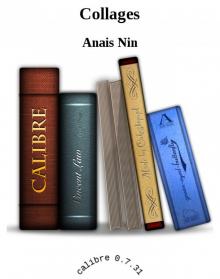 Collages
Collages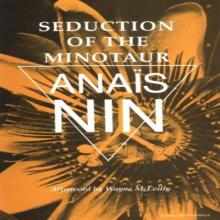 Seduction of the Minotaur
Seduction of the Minotaur Children of the Albatross
Children of the Albatross Delta of Venus
Delta of Venus The Four-Chambered Heart coti-3
The Four-Chambered Heart coti-3 Diary of Anais Nin, Volume 2
Diary of Anais Nin, Volume 2 Diary of Anais Nin, Volume 1
Diary of Anais Nin, Volume 1 Diary of Anais Nin, Volume 4
Diary of Anais Nin, Volume 4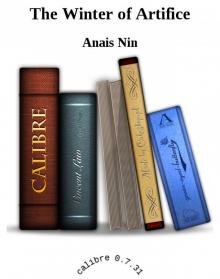 The Winter of Artifice
The Winter of Artifice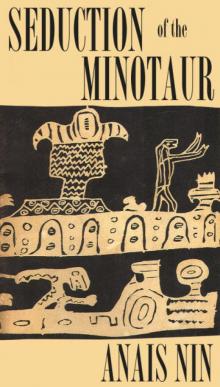 Seduction of the Minotaur coti-5
Seduction of the Minotaur coti-5 Children of the Albatross coti-2
Children of the Albatross coti-2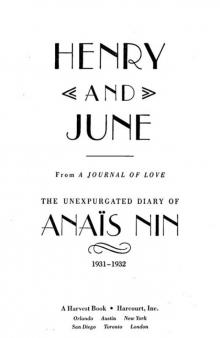 Henry and June: From A Journal of Love -The Unexpurgated Diary of Anaïs Nin (1931-1932)
Henry and June: From A Journal of Love -The Unexpurgated Diary of Anaïs Nin (1931-1932) Ladders to Fire
Ladders to Fire House of Incest
House of Incest